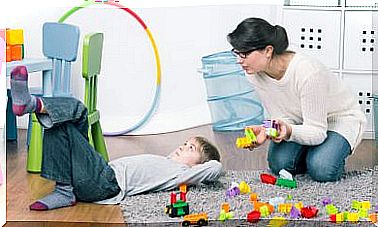How To Take Care Of Your Baby According To His Temperament

New parents can face numerous concerns regarding the care of their little one. But having children before does not guarantee knowing all the answers, since each child is different and has different needs. Therefore, in the following lines we are going to explain the importance of taking care of your baby according to his temperament.
Those who have been mothers more than once can easily confirm the enormous differences that can occur even between siblings. What is very effective with one child with another may not work or even be counterproductive. For this reason, knowing your baby’s temperament will help you understand what he needs from you.

What should you know to take care of your baby according to his temperament?
Temperament is the innate part of our personality. It is marked by biology and genetics and can be easily identified from the first weeks of the baby’s life. This determines the child’s tendency to experience certain types of emotions or react in a specific way.
Thus, three types of temperament are established in which the majority of infants can be included. However, many of them do not fit 100% into any of these alternatives.
Easy temperament
Approximately 40% of babies have this temperament. They are characterized by being balanced children, with a tendency to good humor and an open disposition. Their moods are usually not very intense and they tolerate frustration well.
Likewise, they present fairly regular biological rhythms, so it is easy to establish routines with them. In addition, they react positively to new foods and strangers and are open to new experiences.
Difficult temperament
About 10% of babies belong to the category of so-called “difficult children”. These little ones find it difficult to maintain regular rhythms in their sleeping and eating patterns, and they have a greater tendency to experience negative emotions.
Their emotional states are often extreme and they have difficulty tolerating frustration, which is why they often react with tantrums and tantrums. In addition, they have a hard time accepting new foods and adjusting to unfamiliar situations and people.
Listless temperament
Also called “slow reacting” children with apathetic temperament account for approximately 15% of the total. Arguably, they are somewhere in the middle between easy and difficult children, but are mainly characterized by being half- hearted and unresponsive to their surroundings.
They are very calm children, extremely conformist, who do not protest, but do not show excess positive emotions either. They adapt easily to changes, although sometimes they require a bit more time than other children.
How to take care of your baby according to his temperament?
It will be easy for a mother, taking into account the above indications, to recognize in which group her child is found. Now, if you want to learn how to take care of your baby according to his temperament, think about what he needs based on his characteristics.
Thus, the child with an easy temperament, due to his good disposition, is the ideal baby to implement all the parenting guidelines in a simple way. Take advantage, then, to introduce new foods into his diet, establish appropriate routines and expose him to various stimulations, as all this can be done effortlessly.

On the other hand, babies with difficult temperaments pose a challenge and, therefore, require large doses of patience and understanding. It is important that you do not lose your temper and do not blame your baby; instead, help him manage his negative emotional states and learn to tolerate frustration progressively. These little ones need more love, involvement and effort from their parents.
Finally, children with a listless temperament may be indifferent to external stimulation, but still need it. Therefore, be sure to nurture him physically, psychologically and emotionally, even if the little one does not demand it. Also, respect their times when you go to implement a change and do not pressure them, as they follow their own rhythm.
Adapt to your baby
Ultimately, it is about observing the baby, understanding it and adapting to its needs. Many times, we adults want children to conform to our norms, but everything is easier if we are sensitive and empathetic enough to act according to their characteristics. Taking the time to get to know and understand your baby will be the best decision you can make as a mother.










